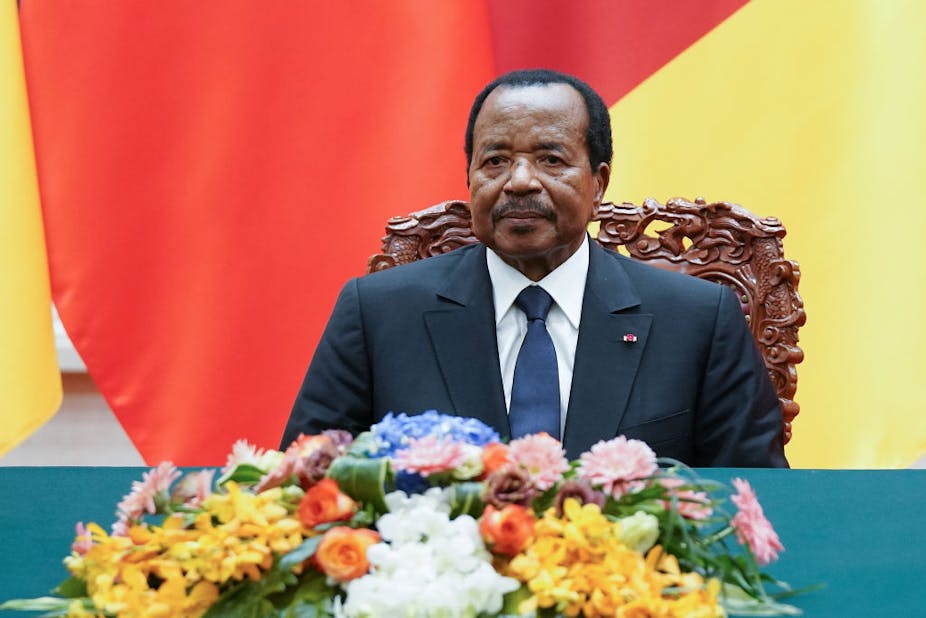Cameroon’s President Paul Biya celebrated his 88th birthday recently, making him the oldest president in Africa. He has been in power for 38 years. Birthday celebrations held across the country were met with protest by the opposition, demanding that he step down. So, how has he acquitted himself in office, and what has been his legacy for Cameroon?
Cameroonians welcomed Biya when he became president in November 1982. The peaceful transfer of power by his predecessor Ahmadou Ahidjo won Cameroon praise as an example to emulate in Africa, where leaders either held on to power for too long, through duplicity and violence, or were forced out.
Ahidjo was ruthless, authoritative, and vicious. He ruled by intimidation. Under him rivals were hunted down, tortured, killed, or forced into exile. He was the “source of all power in the state”.
Biya was seen as a breath of fresh air, and he stepped in saying the right things to different groups. He visited the nation’s Anglophone regions, spoke in English, and even referred to Bamenda, a major city in the Northwest region, as his “second home”. It was a marked difference from his predecessor, whose policies severely undermined English as a major part of the nation’s bilingualism.
Biya’s early actions were received with cheers. He pledged a “new deal” to restore integrity and eliminate corruption. He also announced that although he was of the Beti/Bulu ethnic group, he was born a Cameroonian and would govern as such.
His policies extended elementary and secondary education to rural areas. He allowed press freedom. In his book Communal Liberalism he emphasised the importance of creating a
“more open, more tolerant and more democratic political society”.
But those promises and pronouncements were short-lived.
Hopes dashed
By the end of Biya’s first year in office, he had reverted to his predecessor’s tactics, a practice which intensified after the attempted coup in 1984.
He remade the nation’s only political party, Cameroon National Union, in his image, renaming it the Cameroon People’s Democratic Movement. He packed his administration with people from his ethnic group and drove a solvent economy into insolvency.
His policies targeted and undermined groups like Bamilekes, Anglophones and Northerners.
He changed the name of the country from the United Republic of Cameroon to the Republic of Cameroon, a clear indication that Anglophone concerns did not matter.
He went to the World Bank and International Monitory Fund for help to revive an ailing economy. But, after three decades of intervention by these institutions, the economy remains on the brink of collapse.
The nation’s currency was devalued on his watch in 1994, bringing misery to many.
Corruption became endemic. Cameroon is often ranked as being among the most corrupt countries in the world.
Biya circumvents the country’s multiparty political system at will. He has repeatedly amended the constitution to tighten his grip on power. One amendment, in 2008, was to eliminate presidential term limits.
As a response to protests against excessive centralisation of decision making in Yaounde, Biya signed a decentralisation decree in 1996 to empower regional and local authorities. But 25 years later, that initiative has not been realised. Another failed initiative was the National Commission for the Promotion of Bilingualism and Multiculturalism created in 2017 in response to the Anglophone protest. After billions of francs CFA were squandered, the commission has achieved nothing substantive.
Biya’s Achilles heel is the ongoing Anglophone crisis. He has overstayed his term in office, using underhand manoeuvres to cling to power.
His nearly four decades’ rule has robbed Cameroon of its credibility as a stable and peaceful country. Nations such as the US have repeatedly imposed advisory travel bans on Cameroon.
The true test of leadership
Four years ago, a peaceful protest against the marginalisation of English-speaking people turned violent as Biya’s military responded with arrests and torture.
Some responded with a call for secession of the Anglophone regions and created a virtual Ambazonia Republic. They formed a military wing, Ambazonia Defence Force, and used it to attack Biya’s military and disrupt economic and social services in the region.
My work in Cameroon brings me to the conclusion that the Anglophone crisis degenerated into violence because of miscalculations by Biya’s regime. The resulting crisis has devastated entire communities. The region’s economy has also been crippled, resulting in a wave of crime, and burning of businesses and public facilities.
Cameroon is now a no-go country in many respects.
Foreign policy success
My research shows that Biya’s most enduring achievement has been in his conduct of foreign policy. He remains influential in the African Union, and maintains good relations with France, the US and China.
Cameroon was part of the multinational joint task force which conducted military operations to contain Boko Haram. Biya was key in convincing major powers that Boko Haram posed a global threat.
He settled Cameroon’s conflict with Nigeria over the Bakassi Peninsula and placed relations between the nations on a good footing.
Biya also diversified foreign policy from a focus on France to expanding relations with China (though by 2007 he had begun to regret China’s economic domination in Cameroon). He has encouraged American businesses in Cameroon too.
Even after Cameroon was excluded from the African Growth and Opportunity Act, a programme that allows African nations to export their goods to the US duty free, for human rights violations, US-Cameroon military collaboration continued.
Turning the tide
Given Biya’s unwillingness to step down from power, the global community needs to exert pressure on him to solve the Anglophone crisis.
The crisis exposes the hypocrisy and weaknesses of the current global system. The major powers make noises about human rights, yet fail to stop abuses by Biya’s government.
What happens with the Anglophone crisis may turn out to be the most significant determinant of Biya’s legacy.

